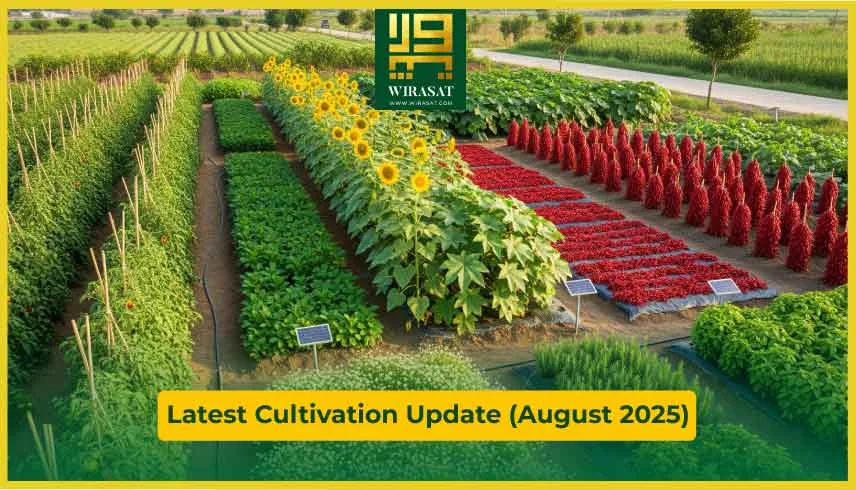Latest Cultivation Update (August 2025)
This update focuses on the current and upcoming cultivation at The Grenoken. Our agriculture expert team had set up beds to hold tomatoes, peanuts, castor, sunflowers, and chillies. The next cycle of crops introduces chamomile, rosemary, oregano, and basil. The plan follows a simple, process-led schedule for nursery work, bed preparation, irrigation, harvest, drying, and packing. Solar power and on-site water support irrigation and post-harvest handling, and road access keeps movement steady in all seasons. The goal is to combine yield with consistent quality and traceability for urban buyers. This Research by Wirasat For readers and investors, this shows a working farm with a predictable harvest calendar and clear sales channels.
Tomatoes
Tomatoes can be harvested multiple times in a single season. This crop can be cultivated in tunnels or open- field. It has a planned schedule for pruning, staking and irrigation. The demand for clean and organic tomatoes is greater in Islamabad. The prices and demand are even higher when the fruit is handled well. Tomatoes can have a longer shelf life by transforming into different forms such as sauces, sun-dried tomatoes and puree. These can stabilize monthly cash flow.
Peanuts
Peanuts add both yield and soil health. They fix nitrogen and can lower fertilizer needs for the next crop. This improves margins over time. The nuts are sold fresh or roasted, and basic value-addition with salted packs, brittle, and peanut butter. Peanut shells can be used for composting or fuel, and press cake from oil extraction can feed back into soil improvement when used carefully.
Castor
Castor is a niche but reliable oilseed with year-round demand from soap, cosmetic, and industrial users. The primary product is castor oil, which commands better pricing than many common oils due to its specialty properties. The leftover press cake is a strong organic fertilizer when handled correctly, closing the loop on farm nutrition. Because buyers are more specialized, forward contracts or repeat MOUs help lock predictable revenue.
Sunflowers
Sunflowers offer two clear revenue lines—edible seeds and oil. The crop is attractive to pollinators, supports farm ecology, and produces a visually marketable field for agritourism photos and events. Dehulled seeds sell as snacks or bakery inputs, while small-scale oil pressing can be developed as a branded item. The seed cake after pressing is a valuable livestock feed or soil amendment, improving the overall economics.
Chillies
Chillies are high value crops used for cooking purposes in restaurants and retail. It can be stored for months in different forms such as chilli powders, chilli flakes, pickles and oil. Drying reduces weight and transport cost and helps standardize quality for repeat buyers. Simple grading by heat level and color lets you target different segments without changing the core crop.
Chamomile
Chamomile is a premium herb for tea. Chamomile flowers are harvested at the right stage, dried gently, and packed into small jars or tea sachets. These productions are for direct sale or café supply. With a basic still, farms can explore essential oil and hydrosol as higher-margin lines, though teas alone carry strong demand. Tasting corners and evening tea walks add an experience layer that supports pricing.
Rosemary
Rosemary is a herb that gives multiple cuts per year. This crop is dried cleanly keeping its aroma, and marketed out in small jars for kitchens and cafés. Infused oils, marinade mixes, and bath sachets are simple extensions that lift revenue without large equipment. The cuttings of Rosemary and potted plants can be sold to guests during farm-stays. This links cultivation to on-site retail and promotes agritourism.
Oregano
Oregano is a culinary herb and it has strong local demand from pizzerias, bakeries, and home cooks. This herb holds flavor when dried, and it makes inventory management and storing easier. Blends such as “pizza spice” or “Mediterranean mix” help move product in small, branded packs. Regular supply schedules encourage standing orders from food businesses in Islamabad.
Basil Seeds
Basil grows fast and sells best fresh, but careful post-harvest handling keeps quality intact. Pesto, dried leaves, infused vinegars, and herb salts convert surplus into stable products. Restaurants value reliable, clean bunches with consistent leaf size, and weekend guests often buy small jars and potted basil as take-home items. A simple cold chain from harvest to dispatch protects color and aroma and supports premium pricing.
Revenue Generation and AgriTourism
Selling and revenue generation improve when production and market are planned together. Fresh items can move through pre-orders, weekly subscription boxes, and café or restaurant supply, while dried herbs and oils suit an on-site farm shop and online listings. Branded, small-format packaging with harvest dates and farm traceability supports the premium that urban buyers are willing to pay for chemical-light produce. Agritourism strengthens this loop: guests see crops in the field, taste them at dinner, and purchase finished products before they leave, keeping the Grenoken farm-stay and farm-store model cash-positive month after month.
Process and simple hospitality can turn a farmhouse at The Grenoken into steady monthly income. Plan crops, manage guest stays well, and review clean numbers every month. Verify documents, define management roles, and start with a focused, modest setup. As results stabilize, scale gradually and let the model compound over time.
The next eight weeks will focus on consistent picking, careful drying, and timely dispatch. Herbs will move into small, branded jars while staples support weekly boxes and café orders. With traceable batches and clean handling, the cultivation plan converts fieldwork into steady monthly sales. This is a practical, low-risk way to show real progress at Grenoken Farms Islamabad.




